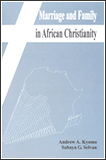
Christian Youth Ministry is a faith-journey of accompanying young people towards an experience of Christ. Accompanying is a process; it is not sporadic interventions of activities done for the young. It is walking with the young. In this essay, I would like to reflect on the theological implications of the process of accompanying young people, in the African context. Taking the cue from the experience of the two disciples on the road to Emmaus (Lk 24: 13-35), I would like to present Jesus as the prototype of a youth minister, thus also to trace the progressive stages in youth ministry.
The two disciples are on the road to Emmaus. Why are they on the road? It is Easter Sunday – “that very same day”, and these disciples are running away from Jerusalem – the epicentre of the great event! They have […]
Africa
Preparing Young People for Marriage
Selvam, S.G. (2004). “Preparing Young People for Marriage in Africa”. In Selvam, S.G & Kyomo, K.A., Marriage and Family in African Christianity (pp.217-227) Nairobi: Acton Press. Click Link for PDF file
Marriage and Family in African Christianity
 Kyomo, A. A., & Selvam, S.G. (2004). Marriage and Family in African Christianity. Nairobi: Acton Press.
Kyomo, A. A., & Selvam, S.G. (2004). Marriage and Family in African Christianity. Nairobi: Acton Press.
Christian Families in Africa are in a phase of crisis. The crisis is about how to face change. Christian missionary activities, colonialism, westernization, urbanization, and a score of other contemporary phenomena have taken the African families to a plateau of change. The question is, will African families succumb to changes or emerge with an alternative stronger family structure?
Every crisis is a challenge and an opportunity. This one sure is. It is a challenge because the old models are not feasible in the changing social environment. The pangs of this new birth seem to bring a lot of anxiety. It is an opportunity because something more beautiful may eventually emerge. Our own reflections, discussions, assessments are very vital to contribute to the reconstruction of African Families.
The Tanzanian […]
Vijana na Tabia hatari
UTUME KWA VIJANA 13
Sahaya G. Selvam, SDB
Sababu za Vijana Kujingiza katika Tabia za Hatari
na Namna ya Kuwasaidia
Katika makala hii tunashirikisha namna ya kuwasaidia vijana ili waweze kuvuka vikwazo vinavyoweza kuwafanya wasifikie malengo waliojiwekea maishani mwao. Tunatambua kwamba, yapo mambo mengi yanayoweza kuwachelewesha au kuwakwaza vijana kutofikia malengo yao ya maisha. Baadhi yake ni kama:
Dawa za kulevya
Ulevi
VVU/Ukimwi
Mimba kabla ya wakati, n.k.
Katika makala hii, tunaelezea sababu chache zinazopelekea vijana (wasichana) kupata mimba kabla ya wakati. Pia tunapendekeza namna ya kuweza kuwasaidia ili wasijikute katika mtego huu na pia waweze kufikia malengo yao katika maisha yao. Ingawa sababu hizi zinawalenga wasichana moja kwa moja, hata hivyo zinaweza kutumika kwa wavulana pia, kwa vile wavulana wanajiingiza katika mambo haya kirahisi kuliko wasichana.
Bi. Tricia M. Davis amefanya utafiti kati ya wasichana wapatao 500 wenye umri wa miaka chini ya 19, waliowahi kupata mimba zaidi ya mara moja. Katika utafiti wake anaeleza sababu saba […]
Short Story – One Euro
The train is dashing through tunnels, gliding over bridges. But I sit there feeling homesick. The initial excitement of coming to Europe has now left an emptiness in my stomach. It is not that I am hungry. I simply miss theugali and sukuma wiki.
I miss the hustle and bustle of Korogocho. The nostalgic smell of the dark dirty soil. The tantalizing smell of nyama choma. The concealed fragrance of Omo from the washing of the clothes on the streets. The jostling crowds and the rubbing of shoulders. The bustling activity around the kiosks. The dirges sung by drunkards as they stagger their way home. The freedom of the children running around.
When you are in those wretched hovels of Nairobi’s slums you dream of being in the skyscrapers of America – or in the castles of Europe. But when you are here, suddenly you feel lonely. Strange!
It is not that the people here are unkind. In fact they are very polite. Very well trained in social etiquette. Simply, you are a stranger. You are not […]